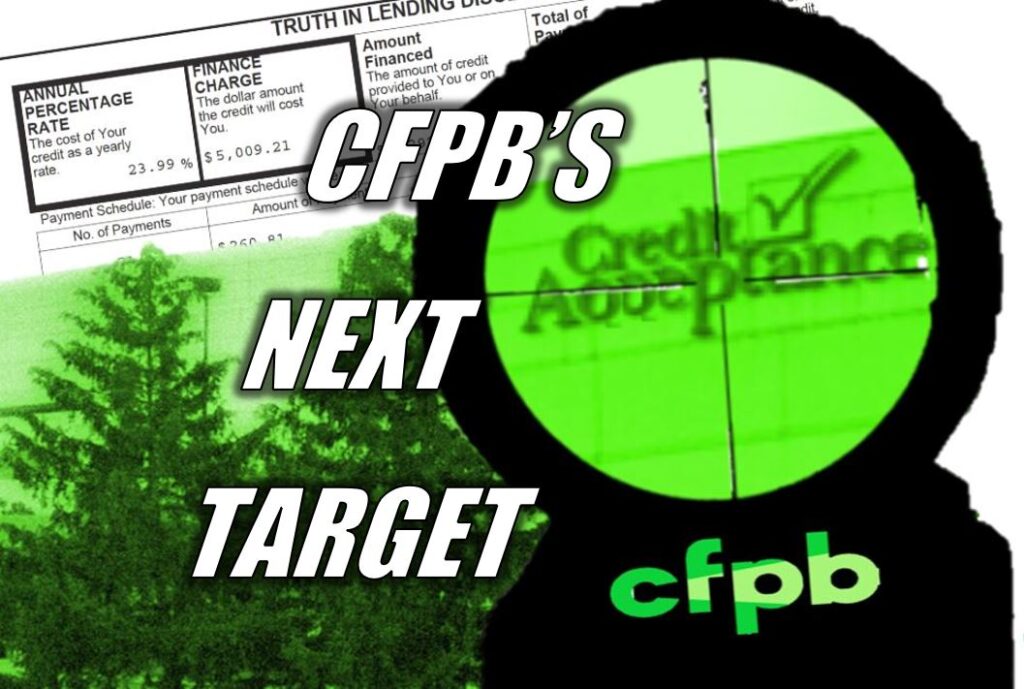
“For almost 4 out of 10 loans, Credit Acceptance predicted that it would not be able to collect the full amount financed by the loan. Credit Acceptance profits even when borrowers are unable to pay their loans in full by using aggressive debt collection methods.”
The Consumer Financial Protection Bureau (CFPB) appears to be starting 2023 right where it left off in 2022. On December 20th, they hit Wells Fargo Bank with fines and civil penalties of $3.9B, now it’s Credit Acceptance Corporation’s (CAC) turn. This should come as little surprise considering as far back as 2018, they’d still managed to make a profit with 35% of their loans defaulting. The only way to make that work is with extreme interest rates, fees and some heavy-handed collections efforts.
Anyone whose been paying attention would know that CAC is well known for being perhaps the most extreme of subprime lenders with an average 22% interest rate charged according to the CFPB. Their collections efforts were diligent, to put it nicely. Back in 2018, it had reported that CAC’s well-oiled collections machine were dominating the court system of Detroit with one out of every eight cases filed being one of theirs.
Just as a little background on CAC, they were founded in 1972 by former car dealer Don Foss. This “old school” lender knew from the beginning what it takes to collect this kind of paper. “I began to realize that, even as I worked as hard as I possibly could at selling cars, we would have to do better on the collections side,” Foss said in 2009, reflecting on how he’d managed to grow and sustain the company.
In 2017, Foss stepped down and sold the company netting $128 million and retiring. Foss passed away in 2022 with a net worth of $2B. CAC is now a publicly traded company under the NASDAQ symbol CACC whose shares are worth $403.94 at the moment.
Even before his death, CAC has been a lightning rod for civil suits and regulatory actions at both the state and federal level. In this most recent action, the CFPB is joined by the New York Attorney General in their lawsuit.
Read Today’s Complaint Here!
Below is the CFPB’s press release on this most recent lawsuit;
CFPB and New York Attorney General Sue Credit Acceptance for Hiding Auto Loan Costs, Setting Borrowers Up to Fail
Major subprime auto lender targets Americans with loans that it predicts they cannot afford to repay
JAN 04, 2023
WASHINGTON, D.C. – Today, the Consumer Financial Protection Bureau (CFPB) and the New York State Office of the Attorney General sued a predatory auto lender, Credit Acceptance Corporation, for misrepresenting the cost of credit and tricking its customers into high-cost loans on used cars. The car-buying experience turns into a nightmare for many of Credit Acceptance’s borrowers, who face unaffordable monthly payments, vehicle repossessions, and debt collection lawsuits. The joint complaint alleges that, among other things, Credit Acceptance hides costs in loan agreements and sets consumers up to fail. The complaint also alleges that Credit Acceptance violated New York usury limits and other consumer and investor protection laws. The lawsuit seeks to force Credit Acceptance to stop its illegal practices, reimburse harmed consumers, pay back wrongfully earned gains, and pay a penalty.
“Credit Acceptance obscured the true cost of its loans to car buyers, leading to severe financial distress for borrowers and subjecting them to aggressive debt collection tactics on loans its own systems predicted that borrowers can’t afford to repay,” said CFPB Director Rohit Chopra. “The CFPB and the New York Attorney General seek to halt Credit Acceptance’s illegal practices and make consumers whole.”
“CAC claimed to help low-income New Yorkers purchase cars, but instead, drove them straight into debt,” said New York Attorney General Letitia James. “CAC steered hardworking New Yorkers onto a path of financial ruin by tricking them into unaffordable, high-interest auto loans while cutting backroom deals with dealers to increase their own profits. These predatory actions hurt innocent people and left them with mountains of debt. I thank the CFPB for their partnership to stop this harm and protect everyday New Yorkers.”
Credit Acceptance (NASDAQ:CACC) is an indirect auto lender headquartered in Southfield, Michigan that funds and services used-car loans for people with low credit scores. Credit Acceptance is one of the country’s largest publicly traded auto lenders and does business with a network of more than 12,000 affiliated used-car dealers. From November 2, 2015 to April 30, 2021, approximately 1.9 million people obtained used car loans through Credit Acceptance and its affiliated dealers. In 2020 alone, consumers obtained more than $4.9 billion in Credit Acceptance-financed loans. The company’s loans typically carry very high interest rates.
Specifically, the company allegedly harmed consumers by:
- Hiding the true cost of credit: Since 2014, Credit Acceptance’s loan agreements nationwide have said that consumers would pay interest at an average 22% APR. However, the true cost of credit offered is far higher than what borrowers are told. This is because Credit Acceptance’s business model pushes dealers to manipulate the prices of vehicles sold to Credit Acceptance borrowers, based on borrowers’ projected performance. This increases the principal balance of the loans. By hiding the true cost of the credit in inflated principal balances, Credit Acceptance evades state interest rate caps and deprives consumers of the ability to make informed decisions, to compare financing options, or to avoid high interest charges.
- Setting up borrowers to fail: Credit Acceptance ensured its own profits by providing loans without regard to whether borrowers could afford them. For almost 4 out of 10 loans, Credit Acceptance predicted that it would not be able to collect the full amount financed by the loan. Credit Acceptance profits even when borrowers are unable to pay their loans in full by using aggressive debt collection methods. As a result of Credit Acceptance’s practices, customers faced late fees, repossessions, auctions, post-repossession collection efforts, lawsuits, and ruined credit profiles.
- Closing its eyes to practices that harmed consumers: The company created financial incentives for dealers to add extra products to loans and then shrugged off whether customers were misled into thinking the add-on products were required. Add-on products, such as vehicle service contracts, are a profit center for Credit Acceptance. They represented about $250 million in revenue in 2020 alone.
When borrowers default on loans, it can lead to severe consequences, including wage garnishment and an inability to borrow money in the future. A default on an auto loan can also lead to the borrower losing their means of transportation, which can cause job loss and a further spiral of damaged credit and financial distress.
This is not the only action targeting Credit Acceptance for violation of consumer financial protection laws. For example, last year, the Massachusetts Attorney General secured more than $27 million for thousands of families harmed by Credit Acceptance.
Enforcement action
Under the Consumer Financial Protection Act, the CFPB has the authority to take action against institutions violating consumer financial protection laws, including engaging in unfair, deceptive, or abusive acts or practices. The CFPB is seeking injunctive relief, monetary relief for consumers, disgorgement of unjust gains, and a civil money penalty.
Over the last decade, the CFPB has consistently partnered with states across the country to enforce federal and state consumer financial protections. Federal law authorizes state attorneys general and state regulators to enforce certain provisions of the Consumer Financial Protection Act. State enforcers can also bring their own claims under state law, including violations of state usury limits.
The complaint is not a final finding or ruling that the defendants have violated the law.
Auto loans are the third largest category of outstanding consumer debt, after mortgages and student loans. In recent years, the cost of vehicles has risen substantially, leading to increased borrowing. Over the last year, the CFPB has increased its monitoring of the auto lending market. The CFPB is also exploring ways to enhance the availability of data about the market.
Consumers can submit complaints about auto loan products, and about other financial products and services, by visiting the CFPB’s website or by calling (855) 411-CFPB (2372).
Employees who believe their companies have violated federal consumer financial protection laws are encouraged to send information about what they know to whistleblower@cfpb.gov. To learn more about reporting potential industry misconduct, visit the CFPB’s website.
###
The Consumer Financial Protection Bureau (CFPB) is a 21st century agency that helps consumer finance markets work by making rules more effective, by consistently and fairly enforcing those rules, and by empowering consumers to take more control over their economic lives. For more information, visit www.consumerfinance.gov.
CFPB Sets its Sites on Credit Acceptance Corp – Consumer Financial Protection Bureau – CFPB










